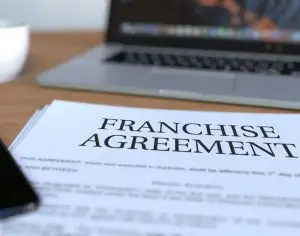Early last summer, I discussed a case which ended up in the High Court. It involved a franchisee who wanted to terminate a franchise agreement approximately 16 months after signing it. The franchisee had explained to the franchisor that they were required to self-isolate during the height of the Covid pandemic, because the franchisee’s son had a vulnerable health condition.
This was the case of Dwyer (UK Franchising) Ltd v Fredbar Ltd, with the High Court ruling in favour of the franchisee. The High Court judged that the agreement’s ‘12-month restraint of trade covenant’ was unreasonable. Dwyer, the franchisor of Drain Doctor, is a plumbing and drain repair services company with more than 60 territories across the UK.
Fredbar Limited signed up for an initial 10-year franchise agreement during the autumn of 2018, with a Mr Bartlett named as the guarantor. Mr Bartlett was granted the exclusive trading rights within nine specific postcode areas of Cardiff. He had no prior experience of plumbing or drainage work, and had never previously been a company director. The franchise was Mr Bartlett’s sole source of income, having left his previous employment to start the franchise business.
Then along came Covid-19, and he approached Dwyer to say he wanted to suspend the Agreement under the ‘force majeure provision,’ because of his need to self-isolate. However, Dwyer argued that this provision did not apply as Drain Doctor was a key worker service.
The franchisor did make an offer to Mr Bartlett, explaining that Fredbar did not need to pay the relevant franchise fees during his period of self-isolation. But they did stress that if Fredbar continued to trade, the company would still need to pay the fees as agreed, otherwise the contract would be terminated.
Fredbar ultimately accepted this offer but Dwyer claimed that during this period of suspension, they discovered evidence that Mr Bartlett was trading as Daily Drains, rather than Drain Doctor. Dwyer wrote to Mr Bartlett to say that Fredbar would not now be resuming trading at the agreed date. Mr Bartlett responded by email saying he was now terminating the Agreement and that Fredbar was no longer intending to be bound by its terms.
Dwyer then gave Mr Bartlett two opportunities to reconsider this position. However, Dwyer then terminated the Agreement by letter in August 2020. At this point, Dwyer brought a claim for damages against Fredbar.
Dwyer believed Fredbar had breached the Agreement and they requested that Mr Bartlett should not engage in any business which was similar to, or a competitor of, Drain Doctor. They wanted this to cover nine Cardiff post code areas, plus a five-mile radius beyond each territory, and to be enforced for 12 months.
And so to the High Court in 2021 when the question that needed to be answered was whether Fredbar’s repudiatory breach had given Dwyer grounds to terminate and recover damages?
With regards to the repudiatory breach, the judge found that Dwyer itself had breached the Agreement by failing to comply properly with the ‘force majeure clause.’ However, the Agreement was affirmed through Mr Bartlett’s acceptance of Dwyer’s offer when Mr Bartlett decided to self-isolate.
Fredbar established that Dwyer had misused marketing and promotional funds, which amounted to a repudiatory breach. Yet the judge accepted that the Agreement was rightly terminated by Dwyer, as a result of Fredbar’s repudiatory breach when the franchisee decided it was no longer bound by its terms.
But the big decision involved the question: Were the Restrictive Covenants enforceable? The judge said the covenant preventing Fredbar from being engaged in any plumbing or drainage business, within the Cardiff region, was unenforceable. He said Fredbar could not be prevented from acting as a sub-contractor, and that Mr Bartlett could not be denied the opportunity of being employed in the future by a plumbing or drainage company.
The court believed it was unable to accept Dwyer’s argument because this would increase the risk of Mr Bartlett becoming unemployed and facing potential financial hardship. The judge expressed that the covenant preventing Mr Bartlett from working within a five-mile radius of his original Drain Doctor territories was considered unreasonable. It was explained that Fredbar had not previously provided any services within it.
The judge accepted that Fredbar would have benefited from knowledge acquired through Dwyer, with regards to its business methods, but added that there were no trade secrets to be protected by these covenants. If there had been, the Judge said that these would have been better addressed by including more specific provisions within the Agreement, such as acting for former customers.
Unhappy with the outcome of this original decision, Dwyer opted to take their case to the Court of Appeal. Unfortunately for them, the Court rejected their appeal. This confirmed the earlier ruling which stipulated that a 12-month post-termination restriction, that prevented the franchisee from carrying on a business similar to that covered by the franchise agreement, was unreasonable and unenforceable.
The court highlighted the following factors, when considering the enforceability of restrictive covenants:
1: Goodwill built up by the franchise business in the allocated territory at the time of termination;
2: Length of the restriction compared to the elapsed time during the current franchise term;
3: Inequality of the bargaining position of the two parties.
A restrictive covenant, preventing a franchisee from establishing another similar business within 12 months of termination of the franchise agreement, is not enforceable. Especially if there has not been insufficient goodwill built up in the allocated territory and if the majority of the term of the franchise agreement has not yet elapsed.
However, the judge indicated that a 12-month restriction of this nature would not necessarily be unenforceable in all cases. Where a franchise is well established and successful, then the need to protect its goodwill may be accepted and that the courts may indeed find that such a restriction is reasonable.
The judge ruled that the restrictive covenants were unreasonable and unenforceable in this scenario. This was down to a combination of factors:
1: The length of time that the franchise agreement had been active prior to termination;
2: The impact that the pandemic has had upon the franchisee’s ability to run the franchise and earn a living outside of the franchise;
3: The lack of experience of the franchisee;
4: The lack of substantial goodwill in the business;
5: The duration of the restriction itself.
When assessing the reasonableness of restrictive covenants, the court confirmed that there is no ‘one size fits all’ solution. Thus, the court will review the relative bargaining strengths of the parties when evaluating the circumstances. The court confirmed that the issues of enforceability, and reasonableness, must be determined by the time the franchise agreement is entered into.
On the facts of the case, the franchisee entered into the agreement with a well-documented element of risk. As a result, the goodwill of the business – at the point of termination – was less valuable than if the franchise had terminated at a later stage.
The duration of the restrictive covenant is crucial when assessing its validity and enforceability. In this case, the judge reasoned that the 12-month period restricting post-termination trading was excessive, especially as the time-elapsed since the signing of the agreement had been minimal, not helped by the outbreak of the pandemic.
The court ruled that the franchise agreement had failed to determine the length of the restrictive period following early termination. The court also argued that the inequality of bargaining power between the two parties was integral in its decision.
The court believes that the relationship between franchisor and franchisee, in this particular case, was more akin to that of an employment contract. The court referred to the inexperience of the franchisee and that the contract was non-negotiable.
In conclusion
This decision complicates the position for franchisors. This is especially so for those relying on having the protection of their restrictive covenants for 12 months following the termination of a franchise agreement.
This ruling flags up the importance of analysing the specific facts for each individual case. It is vital that covenants are drafted narrowly and reviewed regularly to help ensure enforceability. It also creates a high bar for those seeking injunctive relief that ultimately prejudices the interests of others, as opposed to seeking monetary relief in the form of damages.


































